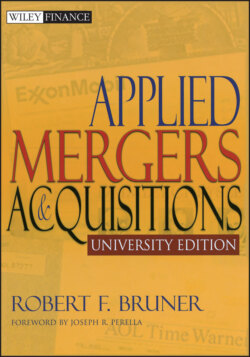Читать книгу Applied Mergers and Acquisitions - Robert F. Bruner - Страница 35
Adopt a Code of Ethics
ОглавлениеOne dimension of ethical behavior is to acknowledge some code by which one intends to live.
Personal. Various religious and secular traditions afford the basis for a personal code of ethics, the foundation for all ethical behavior. But ethical values vary from one person to the next, perhaps creating dissonance and ensuring that one person’s assumptions about his or her colleague’s values may not be valid. To focus only on personal ethics is inward looking and ignores values on which a team, company, or society might agree.
Corporate. Firms recognize the “problem of the commons” inherent in unethical behavior by one or a few employees. In 1909, the U.S. Supreme Court decided that a corporation could be held liable for the actions of its employees.14 Since then, companies have sought to set expectations for employee behavior, including codes of ethics.15 Exhibit 2.1 gives an example of one such code, from General Electric Company. These norms are merely the first page of a 32-page document outlining the code, to whom it applies, special responsibilities for employees and leaders, specific codes of conduct with respect to customers and suppliers, government business, competition, health, safety, employment, and protection of GE assets. Corporate codes are viewed by some critics as cynical efforts that seem merely to respond to executive liability that might arise from white-collar and other economic crimes. Companies and their executives may be held liable for employee behavior, even if the employee acted contrary to instructions. In 1991, the U.S. Sentencing Commission handed down seven mitigating factors16 that may reduce the likelihood of criminal prosecution of companies; among these is promulgating a code of behavior against which the firm should conduct internal investigations. Mere observance of guidelines in order to reduce liability is a legalistic approach to ethical behavior. In contrast, Lynn Sharpe Paine (1994) urges firms to adopt an “integrity strategy” that uses ethics as the driving force within a corporation. Deeply held values would become the foundation for decision making across the firm and would yield a frame of reference that would integrate functions and businesses. By this view, ethics defines what a firm stands for.
EXHIBIT 2.1 General Electric’s “Code of Conduct”Obey the applicable laws and regulations governing our business conduct worldwide.Be honest, fair, and trustworthy in all your GE activities and relationships.Avoid all conflicts of interest between work and personal affairs.Foster an atmosphere in which fair employment practices extend to every member of the diverse GE community.Strive to create a safe workplace and to protect the environment.Through leadership at all levels, sustain a culture where ethical conduct is recognized, valued, and exemplified by all employees.Source: “Integrity: The Spirit and Letter of Our Commitment,” General Electric Company, October 2000, page 3. A longer version of this resource is also available on the company’s web site at www.integrity.ge.com.
Professional or industry. Some professional groups organize codes of ethics. One example relevant for M&A professionals is the code of ethics of the Association for Investment Management and Research (AIMR), the group that confers the Chartered Financial Analyst (CFA) designation on professional securities analysts and portfolio managers. Excerpts from the AIMR Code of Ethics and AIMR Standards of Professional Conduct are given in Exhibit 2.2. In a public advertisement, AIMR wrote, “Just as each and every investment professional is hurt by the scandals, so must each and every one of us work to repair the damage to our professional and to the financial markets. It will not be enough simply to abide by all the requirements of the law. We must demonstrate that we are committed to the highest standards of professional conduct if we are going to restore investor confidence and trust. This cannot be a onetime commitment or a passing response to recent events. For example, as CFA charter holders and AIMR members, we attest annually in writing to our continued adherence to the AIMR Code and Standards…. Violations can and do bring enforcement actions that can lead to revocations of AIMR membership and the right to use the CFA designation.”17
EXHIBIT 2.2 Excerpts from AIMR Code of Ethics and AIMR Standards of Professional Conduct
AIMR Code of Ethics
Act with integrity, competence, dignity, and in an ethical manner….
Practice and encourage others to practice in a professional and ethical manner….
Strive to maintain and improve our competence and the competence of others in the profession.
Use reasonable care and exercise independent professional judgment.
AIMR Standards of Professional Conduct (in part)
… Act for the benefit of our [investing] clients and place their interests before our own.
Use reasonable care and judgment to achieve and maintain independence and objectivity.
… Have a reasonable and adequate basis, supported by appropriate research and investigation, in making investment recommendations or taking investment actions.
Avoid any material misrepresentation in any research report or investment recommendation.
Disclose to clients and prospects all matters that reasonably could be expected to impair our ability to make unbiased and objective recommendations.
Deal fairly and objectively with all clients and prospects.
Not engage in any professional conduct involving dishonesty, fraud, deceit, or misrepresentation.
Exercise reasonable supervision to prevent any violation of the Code and Standards by those subject to our supervision and authority.
Source: Thomas A. Bowman, “An Open Letter to Leaders of the Investment Community,” Wall Street Journal, January 23, 2003, page C3.
Codes of ethics are easily reduced to a mentality of compliance (e.g., observance of checklists and other external reminders that can be monitored). The flaw with the mentality of compliance is that it is fundamentally mindless. Ethical issues are subtle and demand mindful engagement to be detected and resolved.
